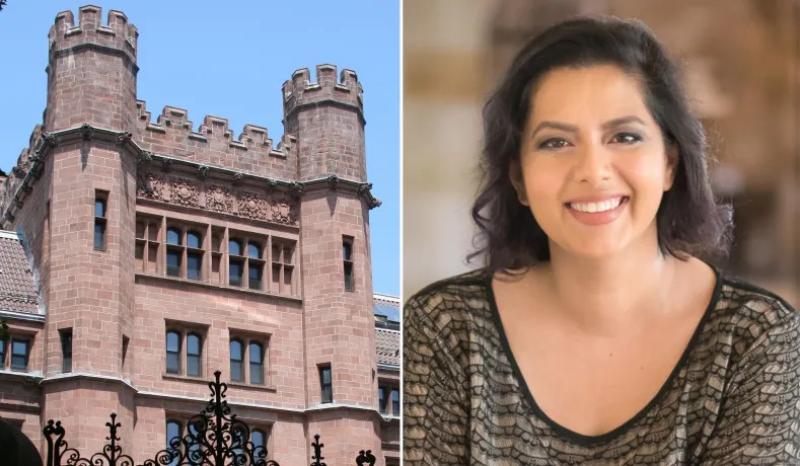Yale’s Case Study in Free-Speech Hypocrisy
By: Lauren Noble (National Review)
A bastion of entitlement fostering tantrums from the self-important privileged? Say it ain't so.

E ven at Yale, it is not every day that a faculty member expresses “solidarity” — and apparent glee — over the murder, rape, and kidnapping of civilians.
So it did not go unnoticed when, as Israel was reeling from the deadliest terror attack in its history, associate professor Zareena Grewal proclaimed on X that “Palestinians have every right to resist through armed struggle” against a “genocidal settler state.” She also circulated a video of the onslaught captioned, “It’s been such an extraordinary day!”
Over 50,000 people subsequently signed a petition calling on Yale to fire Grewal for her support of terrorism. The university responded quickly, declining to discipline Grewal based on its commitment to freedom of speech.
Anyone who has followed headlines about Yale over the past decade may be understandably surprised to learn that the university has such principles.
While Yale’s free-speech policy calls for “the right to think the unthinkable, discuss the unmentionable, and challenge the unchallengeable,” recent years have provided countless reasons to think the university has abandoned this ideal in favor of defending the progressive campus orthodoxy.
Yale recently ranked No. 234 for free speech out of 248 schools by the Foundation for Individual Rights and Expression (FIRE). Last year, students at Yale Law School disrupted a panel on free speech because one of the speakers was from advocacy group Alliance Defending Freedom, with no consequences for doing so. In fall 2021, a Native-American student was pressured by the administration to apologize for a Constitution Day party invite.
The best-known example of Yale failing on free speech came in October 2015 with the infamous Halloween-costume incident. In response to an email from Yale’s Intercultural Affairs Council discouraging “culturally appropriative Halloween costumes,” Erika Christakis, associate master of Yale’s Silliman residential college, argued that perhaps Yale students were mature enough to choose their own Halloween costumes without Yale policing them. She wondered , “Have we lost faith in young people’s capacity . . . to exercise self-censure . . . and . . . to ignore or reject things that trouble [them]?” She went on to encourage Yale’s student body to “talk to each other. Free speech and the ability to tolerate offence are the hallmarks of a free and open society.”
Some Yale students vehemently disagreed. When Silliman College master Nicholas Christakis defended his wife’s free speech and “the right for people to speak their mind . . . several students screamed at Christakis, calling him ‘disgusting’ and using expletives.”
Instead of publicly defending the Christakises’ free speech during a meeting with students that evening, Yale president Peter Salovey sympathized with the protesters: “We failed you,” he told them . According to a Washington Post report, Salovey “declined to make promises” about whether he would eliminate or defend the Christakises’ positions. In a campus-wide email the following day, Salovey did not mention the Christakises at all.
Over the ensuing days, in what has since become a familiar playbook, Erika was called a “white supremacist” and a bigot. Students, faculty members, and others demanded that the Christakises be fired as the mob coalesced and intensified.
Nearly two weeks later, Salovey finally commented : “No one has been silenced or punished for speaking their minds, nor will they be.” But it was too little, too late. Erika stopped teaching. The Christakises ultimately resigned from their residential-college posts.
And the students who mobbed Nicholas Christakis and demanded his and his wife’s firing? Yale gave them graduation awards for “exemplary leadership in enhancing race and/or ethnic relations at Yale.”
In contrast, after Grewal celebrated mass atrocities against civilians as news of their depth and extent was still breaking, Yale pointed to her free-speech rights within one day. Based on the university’s track record, it won’t be surprising if Grewal soon receives a leadership award, too.
The irony is that Grewal herself has cheered on Yale’s retreat from free-speech principles. She defended the students who sought to punish the Christakises as seeking “respect.” Elsewhere, she dismissed “hand wringing over free speech on college campuses” as a “manufactured crisis.”
The truth is that Yale’s — like Grewal’s — approach to free speech has been inconsistent all along, too often predicated on the speech in question.
Salovey has argued that free speech does not conflict with his vision of a campus where “hatred and discrimination are never tolerated.” In practice, free speech trumps at Yale only when it does not violate the campus orthodoxy. Apparently, hating Jews and Israelis does not count in that regard.
And now Grewal will be protected by the important free-speech principles she previously sought to undermine.
Yale’s response lays bare its hypocrisy on free speech on campus. Challenge the campus orthodoxy? Be left to the mob. Align with a radical left-wing cause? The university will jump to your defense. Support murder, rape, and crimes against humanity? That’s okay as long as you’re woke.





Why isn't 'woke' just another manifestation of entitled privilege? The only necessity is to throw a tantrum in the toy aisle to get what you want.